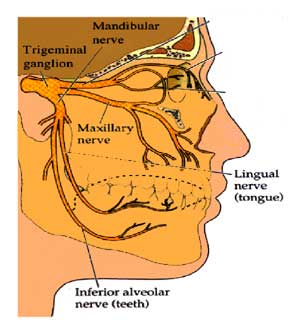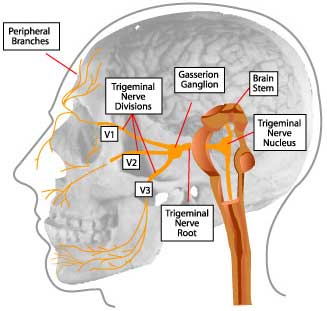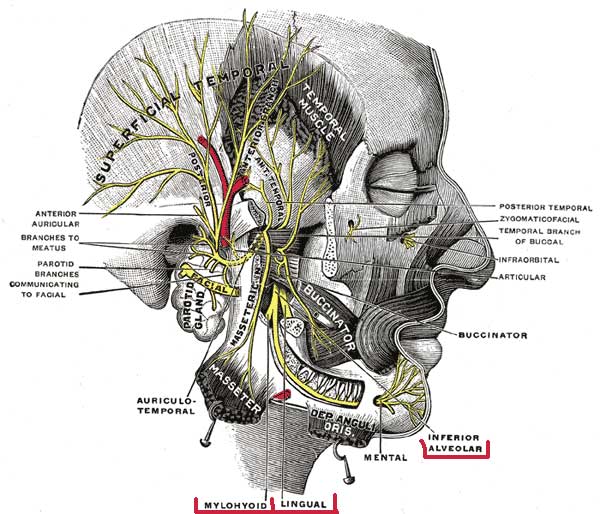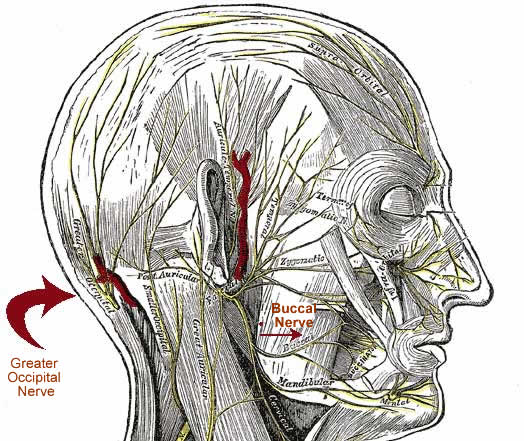|
Wisdom Teeth Removal Complications - In Depth Look at Nerve Damage
Nerve damage is a possible complication of wisdom teeth removal. The mandibular nerve enters the back of the bone of the lower jaw. (See the Figure on the right). The mandibular nerve has many branches which consist of nerves implicated in taking out wisdom teeth. The most well known of these are the lingual nerve and the inferior alveolar nerve. It is apparent from the figure on the right that these nerves are clearly beneath the lower teeth and thus can be damaged when removing one of the lower wisdom teeth. The lingual nerve supplies sense of touch and taste to the right and left half of the anterior 2/3 of the tongue as well as the lingual gingiva. The inferior alveolar nerve supplies sensation to the lower teeth on the right or left half of the dental arch, as well as sense of touch to the right or left half of the chin and lower lip.
Nerve damage occurs when can a nerve is traumatized, crushed or completely cut. The numbness is called parasthesia. Because nerves heal slowly the mandibular nerve recovers in about three to six months. If after a year recovery hasn't occured the nerve damage is likely permanent. This happens to about 2 in 100 people after wisdom teeth removal.

The mandibular nerve is the largest of 3 branches of the trigeminal nerve. It is branch V3 as shown on the Figure to the left. If damage to this branch is to occur it can cause additional problems.All sensory information from the face is sent to the trigeminal nerve nucleus. The three parts of the trigeminal nucleus receive different types of sensory information. The spinal trigeminal nucleus receives pain/temperature fibers. The main trigeminal nucleus receives touch/position fibers. The mesencephalic nucleus receives proprioceptor and mechanoreceptor fibers from the jaws and teeth. Therefore damage to the mandibular nerve can cause pain, not regulate temperature properly, and feel numb.
Paresthesia symptoms include frequent drooling, biting of the lip or the inside of the cheek or the side of the tongue, and paralytic disfigurement or drooping of the lip. The sense of taste, the facility of speech (as in slurred speech), and the sensory pleasure of kissing are diminished. Constant tingling numbness is the most common feature.
Nerve damage can have long lasting affects on employment and the ability to work, can affect relationships, lead to problems eating, lead to depression, lead to insomnia, and lead to a reduction in mental energy, memory, and cognitive functions.
It may also be possible for trigeminal nerve injuries to develop into trigeminal neuralgia. The attacks are said to feel like stabbing electric shocks or shooting pain that becomes intractable. Individual attacks affect one side of the face at a time, last several seconds or longer, and repeats up to hundreds of times throughout the day. Trigeminal neuralgia is considered by many to be among the most painful of conditions and once was labeled the suicide disease because of the significant numbers of people taking their own lives before effective treatments were discovered. Those suffering from severe paresthesia may be driven to near hysteria by a loss of sensory functions that affects all aspects of their lives.
See this post for a look at some patients overall quality of life decrease after suffering from nerve damage from dental treatment and some indications for when nerve damage surgery for such patients may be indicated https://blog.teethremoval.com/long-term-effects-of-trigeminal-nerve-injuries-from-dental-care/
Other Nerves Known To be Damaged
The buccal nerve, mylohyoid nerve, glossopharyngeal nerve, nasopalatine nerve, and facial nerve have been damaged during wisdom teeth removal. There is evidence that the use of lingual nerve retraction can increase the risk of mylohyoid nerve damage. The mental nerve can be damaged as well which is a branch of the inferior alveolar nerve.

Additonal Considerations
It is possible that other neves could be damaged with wisdom teeth removal than the others previously mentioned above. This include the auriculotemporal nerve and the occipital nerve. The occipital nerve is located in the neck and could be damaged if the patient is not placed properly in the dental chair when having their teeth taken out.
Headache Caused by Nerve Damage
The international headache society states that injury or entrapment of peripheral branches of the trigeminal nerve other than the nasocilliary and supraoribital nerves may give rise to pain referred to the area innervated by the branch affected. Examples are neuralgias of the infraorbital, lingual, alveolar, and mental nerves. Thus nerve damage to the lingual and alveolar nerves (among others) is a cause of headache.

References
1. Removing Wisdom Teeth. Clinical Evidence, the British Medical Journal. Written September 2006.
2. American Association of Oral and Maxillofacial Surgeons. White Paper on Third Molar Data.
Written March 2007.
3. Anesthesia UK. http://www.frca.co.uk/images/trigeminal_nerve.jpg
4. The International Headache Society. The International Classification of Headache Disorders, 2nd edition. Written 2004.
5. C. Katre and et. al. Int. J. Oral Maxillofac. Surg. Inferior alveolar nerve damage caused by bone wax in third molar surgery. 2010. vol. 39. issue 5. pages 511–513.
6. Irja Venta and et al. Malpractice claims for permanent nerve injuries related to third molar removals. Acta Odontol Scand. vol. 56. no. 4. pages 193–196. 1998.
7. Sung-Kiang Chuang, David H. Perrott, and Thomas B. Dodson. Age as a Risk Factor for Third Molar Surgery Complications. J Oral Maxillofac Surg. vol. 65. issue 9. pages 1685-1692. 2007.
8. Edward Ellis III, James R. Hupp, and Myron R. Tucker. Contemporary Oral and Maxillofacial Surgery. 4th edition. Mosby. December 5, 2002.
9. M. Anthony Pogrel, Ryan Jergensen, Eric Burgon, and Daniel Hulme. Long-Term Outcome of Trigeminal Nerve Injuries Related to Dental Treatment. J Oral Maxillofac Surg. vol. 69. pages 2284-2288. 2011.
10. Lehner v. Paul Revere Life Insurance Co. 2003 B.C.J. No. 356. British Columbia Supreme Court. February 14, 2003.
| 
